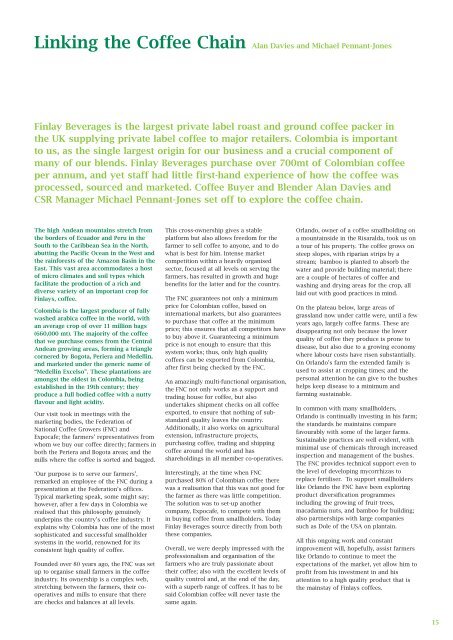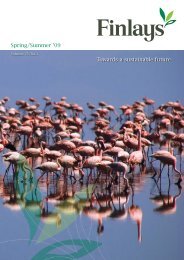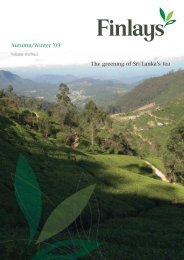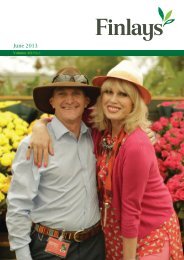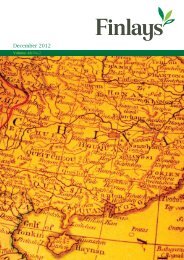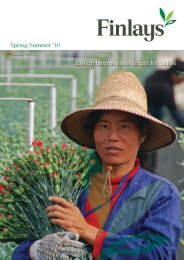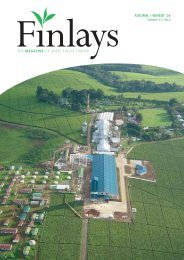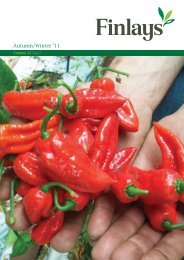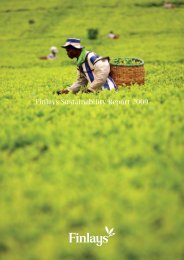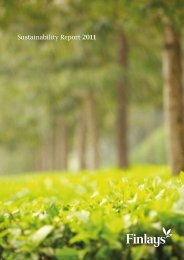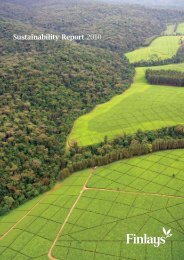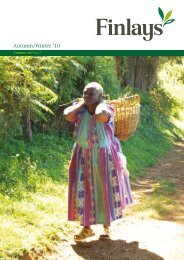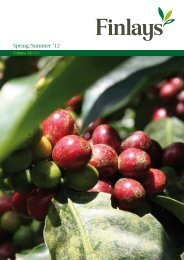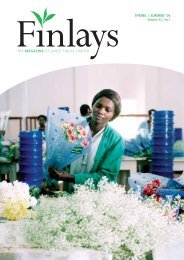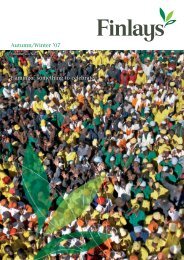Create successful ePaper yourself
Turn your PDF publications into a flip-book with our unique Google optimized e-Paper software.
Linking the Coffee Chain Alan Davies and Michael Pennant-Jones<br />
Finlay Beverages is the largest private label roast and ground coffee packer in<br />
the UK supplying private label coffee to major retailers. Colombia is important<br />
to us, as the single largest origin for our business and a crucial component of<br />
many of our blends. Finlay Beverages purchase over 700mt of Colombian coffee<br />
per annum, and yet staff had little first-hand experience of how the coffee was<br />
processed, sourced and marketed. Coffee Buyer and Blender Alan Davies and<br />
CSR Manager Michael Pennant-Jones set off to explore the coffee chain.<br />
The high Andean mountains stretch from<br />
the borders of Ecuador and Peru in the<br />
South to the Caribbean Sea in the North,<br />
abutting the Pacific Ocean in the West and<br />
the rainforests of the Amazon Basin in the<br />
East. This vast area accommodates a host<br />
of micro climates and soil types which<br />
facilitate the production of a rich and<br />
diverse variety of an important crop for<br />
<strong>Finlays</strong>, coffee.<br />
Colombia is the largest producer of fully<br />
washed arabica coffee in the world, with<br />
an average crop of over 11 million bags<br />
(660,000 mt). The majority of the coffee<br />
that we purchase comes from the Central<br />
Andean growing areas, forming a triangle<br />
cornered by Bogota, Periera and Medellin,<br />
and marketed under the generic name of<br />
“Medellin Excelso”. These plantations are<br />
amongst the oldest in Colombia, being<br />
established in the 19th century; they<br />
produce a full bodied coffee with a nutty<br />
flavour and light acidity.<br />
Our visit took in meetings with the<br />
marketing bodies, the Federation of<br />
National Coffee Growers (FNC) and<br />
Expocafe; the farmers’ representatives from<br />
whom we buy our coffee directly; farmers in<br />
both the Periera and Bogota areas; and the<br />
mills where the coffee is sorted and bagged.<br />
‘Our purpose is to serve our farmers’,<br />
remarked an employee of the FNC during a<br />
presentation at the Federation’s offices.<br />
Typical marketing speak, some might say;<br />
however, after a few days in Colombia we<br />
realised that this philosophy genuinely<br />
underpins the country’s coffee industry. It<br />
explains why Colombia has one of the most<br />
sophisticated and successful smallholder<br />
systems in the world, renowned for its<br />
consistent high quality of coffee.<br />
Founded over 80 years ago, the FNC was set<br />
up to organise small farmers in the coffee<br />
industry. Its ownership is a complex web,<br />
stretching between the farmers, their cooperatives<br />
and mills to ensure that there<br />
are checks and balances at all levels.<br />
This cross-ownership gives a stable<br />
platform but also allows freedom for the<br />
farmer to sell coffee to anyone, and to do<br />
what is best for him. Intense market<br />
competition within a heavily organised<br />
sector, focused at all levels on serving the<br />
farmers, has resulted in growth and huge<br />
benefits for the latter and for the country.<br />
The FNC guarantees not only a minimum<br />
price for Colombian coffee, based on<br />
international markets, but also guarantees<br />
to purchase that coffee at the minimum<br />
price; this ensures that all competitors have<br />
to buy above it. Guaranteeing a minimum<br />
price is not enough to ensure that this<br />
system works; thus, only high quality<br />
coffees can be exported from Colombia,<br />
after first being checked by the FNC.<br />
An amazingly multi-functional organisation,<br />
the FNC not only works as a support and<br />
trading house for coffee, but also<br />
undertakes shipment checks on all coffee<br />
exported, to ensure that nothing of substandard<br />
quality leaves the country.<br />
Additionally, it also works on agricultural<br />
extension, infrastructure projects,<br />
purchasing coffee, trading and shipping<br />
coffee around the world and has<br />
shareholdings in all member co-operatives.<br />
Interestingly, at the time when FNC<br />
purchased 80% of Colombian coffee there<br />
was a realisation that this was not good for<br />
the farmer as there was little competition.<br />
The solution was to set-up another<br />
company, Expocafe, to compete with them<br />
in buying coffee from smallholders. Today<br />
Finlay Beverages source directly from both<br />
these companies.<br />
Overall, we were deeply impressed with the<br />
professionalism and organisation of the<br />
farmers who are truly passionate about<br />
their coffee; also with the excellent levels of<br />
quality control and, at the end of the day,<br />
with a superb range of coffees. It has to be<br />
said Colombian coffee will never taste the<br />
same again.<br />
Orlando, owner of a coffee smallholding on<br />
a mountainside in the Risaralda, took us on<br />
a tour of his property. The coffee grows on<br />
steep slopes, with riparian strips by a<br />
stream; bamboo is planted to absorb the<br />
water and provide building material; there<br />
are a couple of hectares of coffee and<br />
washing and drying areas for the crop, all<br />
laid out with good practices in mind.<br />
On the plateau below, large areas of<br />
grassland now under cattle were, until a few<br />
years ago, largely coffee farms. These are<br />
disappearing not only because the lower<br />
quality of coffee they produce is prone to<br />
disease, but also due to a growing economy<br />
where labour costs have risen substantially.<br />
On Orlando’s farm the extended family is<br />
used to assist at cropping times; and the<br />
personal attention he can give to the bushes<br />
helps keep disease to a minimum and<br />
farming sustainable.<br />
In common with many smallholders,<br />
Orlando is continually investing in his farm;<br />
the standards he maintains compare<br />
favourably with some of the larger farms.<br />
Sustainable practices are well evident, with<br />
minimal use of chemicals through increased<br />
inspection and management of the bushes.<br />
The FNC provides technical support even to<br />
the level of developing mycorrhizas to<br />
replace fertiliser. To support smallholders<br />
like Orlando the FNC have been exploring<br />
product diversification programmes<br />
including the growing of fruit trees,<br />
macadamia nuts, and bamboo for building;<br />
also partnerships with large companies<br />
such as Dole of the USA on plantain.<br />
All this ongoing work and constant<br />
improvement will, hopefully, assist farmers<br />
like Orlando to continue to meet the<br />
expectations of the market, yet allow him to<br />
profit from his investment in and his<br />
attention to a high quality product that is<br />
the mainstay of <strong>Finlays</strong> coffees.<br />
15


